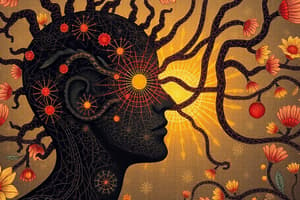Podcast
Questions and Answers
What is the key characteristic that distinguishes Bipolar I from Bipolar II?
What is the key characteristic that distinguishes Bipolar I from Bipolar II?
- The presence of suicidal thoughts
- The presence of hypomanic episodes
- The presence of manic episodes (correct)
- The presence of depressive episodes
What is the estimated heritability of BPD?
What is the estimated heritability of BPD?
- 80%
- 70%
- 60% (correct)
- 30%
What is the term for genetic predisposition to a psychological disorder?
What is the term for genetic predisposition to a psychological disorder?
- Stress
- Vulnerability
- Heritability
- Diathesis (correct)
What type of neurotransmitter imbalance is associated with BPD?
What type of neurotransmitter imbalance is associated with BPD?
Which brain region is responsible for emotion regulation and stress response in individuals with major depression?
Which brain region is responsible for emotion regulation and stress response in individuals with major depression?
Which brain region is involved in BPD?
Which brain region is involved in BPD?
What is the estimated heritability of Major Depressive Disorder?
What is the estimated heritability of Major Depressive Disorder?
What is the term for the external triggers that can lead to the development of a psychological disorder?
What is the term for the external triggers that can lead to the development of a psychological disorder?
What is the purpose of ECT in treating psychiatric disorders?
What is the purpose of ECT in treating psychiatric disorders?
Which neurotransmitter imbalance is associated with Major Depressive Disorder?
Which neurotransmitter imbalance is associated with Major Depressive Disorder?
What is the potential benefit of psilocybin-assisted therapy in treating psychiatric disorders?
What is the potential benefit of psilocybin-assisted therapy in treating psychiatric disorders?
What is the term for the measurement of genetic contribution to individual differences in traits?
What is the term for the measurement of genetic contribution to individual differences in traits?
What is the mechanism of action of ketamine in treating depression?
What is the mechanism of action of ketamine in treating depression?
What is the characteristic of Bipolar Disorder?
What is the characteristic of Bipolar Disorder?
What is the FDA-approved indication for ketamine?
What is the FDA-approved indication for ketamine?
Which gene is linked to Major Depressive Disorder?
Which gene is linked to Major Depressive Disorder?
Study Notes
Neurobiology of Psychological Disorders
- Diathesis-stress model: psychological disorders result from the interaction between genetic vulnerability (diathesis) and external stressors.
Heritability and Risk
- Heritability (h2) measures the extent to which genetic factors contribute to individual differences in traits.
- Genetic influences play a significant role in phenotypic variation among individuals.
- Heritability estimates the degree to which genes account for variations in traits.
Mood Disorders
Major Depressive Disorder
- Characterized by persistent feelings of sadness, emptiness, or irritability.
- High comorbidity with substance abuse.
- Stress can trigger the onset of depression, with individuals experiencing more stressful events before symptom onset.
- Depression can be reactive (triggered by negative experiences) or endogenous (without apparent external triggers).
- Biological theories involve various biomarkers, including toxic free radicals, cortisol, and epigenetics.
- Structural differences in the brain: higher activity in the amygdala, smaller size of the hippocampus, and abnormalities in Brodmann area 25 and frontopolar area 10.
- Neurotransmitter imbalances: low levels of norepinephrine and serotonin.
- Genetics play a role, with heritability estimated at 30-40% and potential links to abnormality in the 5-HTT gene.
Bipolar Disorder
- Bipolar I: involves manic episodes.
- Bipolar II: characterized by mostly depressive episodes with at least one hypomanic episode.
- Genetic factors contribute significantly, with heritability estimated at 60%.
- Biological theories involve genetic studies, neurotransmitter imbalances, and structural abnormalities in the brain, including the HPA axis and areas like the basal ganglia and cerebellum.
Biological Treatment
- Pharmaceuticals for MDEs: antidepressant medications like MAOIs, Tricyclics, SSRIs, and SSRI/SSNIs.
- Bipolar treatment: Lithium carbonate, antidepressants, and anticonvulsants.
- SSRIs and Black Box Warnings:
- May increase suicidality, especially in children and adolescents.
- Activating effect may lead to increased energy before mood improvement, potentially contributing to suicidality.
Alternatives to Medication
- Electroconvulsive therapy (ECT): involves passing volts through the brain to promote changes and neurotransmitter release.
- Vagus nerve stimulation and Deep Brain Stimulation (DBS) are non-pharmaceutical options for treating psychiatric disorders.
Psychedelic Treatments
- Psilocybin:
- Shows long-lasting antidepressant effects.
- Supportive psychotherapy combined with psilocybin may provide benefits for patients with psychiatric disorders.
- Ketamine:
- Shows rapid improvement in depressive symptoms.
- Approved by the FDA for treatment-resistant depression.
- Lower BDNF levels in bipolar disorder patients may lead to reduced EGR3 levels and neuroprotection.
Studying That Suits You
Use AI to generate personalized quizzes and flashcards to suit your learning preferences.
Description
Explore the Diathesis-Stress Model, which explains how psychological disorders arise from the interaction of genetic vulnerability and external stressors. Learn about heritability and risk factors.




